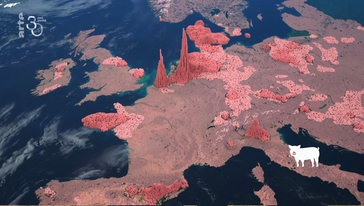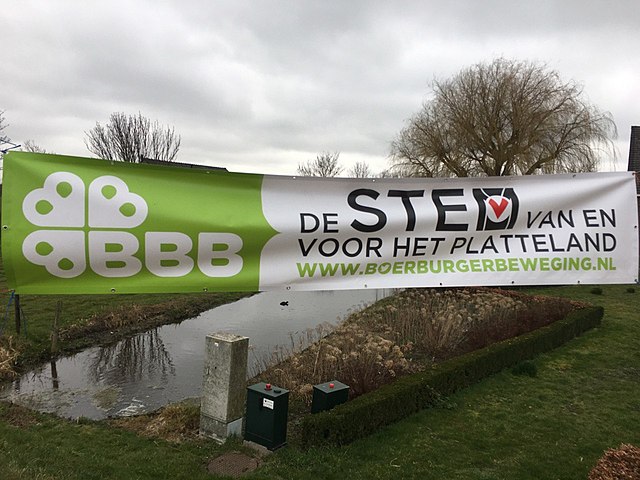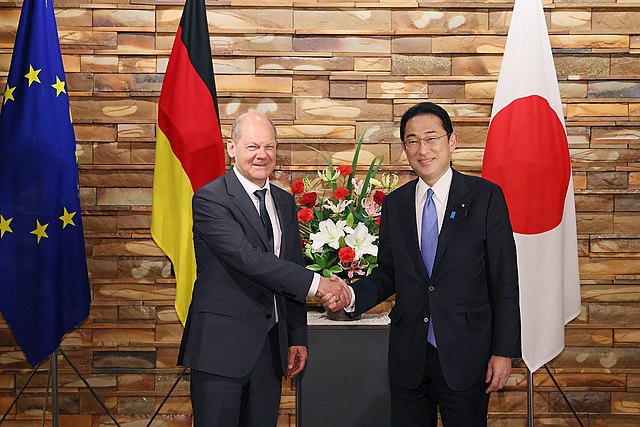As was expected, the governing parties, the right liberal VVD, the liberal D66 and the Christian democrat CDA, suffered defeat in the recent provincial elections as discontent with government policy runs ever deeper. The new right wing farmers party BBB, who participated in the provincial elections for the first time, became the biggest party in all of the twelve provinces on the cusp of a far right rural movement railing against nitrate restrictions on intensive cattle farming. The massive victory for BBB came at the expense of other extreme right parties like Geert Wilders’ PVV and Thierry Baudet’s so-called “Forum for Democracy” (FvD) as well as the governing parties VVD and CDA.
While the vote shifted from other, more extreme right parties to the BBB, the far right camp in general – consisting of the BBB, PVV, FvD and the JA21 – has continued to grow. If one includes the Christian fundamentalist SGP, which has clearly positioned itself in the far right camp over the last years, the right wing fringe has managed to gain 28 out of 75 seats in the Dutch upper chamber of the legislative (which are determined by the provincial councils). In the previous provincial election in 2019, which was marked at the time as a landslide victory for the fascist FvD, the extreme right only managed to obtain 17 senate seats (19 if you include the SGP).
Commentators in the Dutch press gladly join in with the right wing talking point that there is a rural revolt against the big cities. This follows a century old trope masking right wing extremism as “farmer common sense” – a frame used mostly by demagogues in the cities rather than farmers themselves. Most recently it was deployed by the extreme right wing “journalist” and propagandist Wierd Duk in 2018 when he justified the action of fascist “blockading Frisians” who blockaded a highway to prevent anti-racist activists from protesting the racist ‘Zwarte Piet’ figure featured in the Dutch St. Nicholas celebrations.
A superficial glance at the facts will do to show that nothing about this frame fits the reality of the situation. Initially, the rise of the far right was an urban and sub-urban phenomenon. Of all places, the working class city of Rotterdam was the site of the rise of the Islamophobic and far right Pim Fortuyn who broke the taboo on explicitly racist politics in the Netherlands. Even the gains of the farmers party BBB are not limited to rural areas. And the Dutch countryside has seen a gradual shift to the right from the CDA, initially benefitting the right liberal VVD.
The victory for the BBB is a disaster for the climate and for biodiversity. The VVD and CDA have done all they can to shift responsibility for nitrate regulations on cattle farming to the provinces, hoping that the provincial councils would block the national policy. Following last weeks’ election result, they will likely succeed in this, although they have gotten more than they bargained for. Now that the BBB is the biggest party, it is almost certain that nitrate regulations will be stalled and eventually rewritten in the interests of the agricultural and processing companies. The provincial council fractions of VVD and CDA will likely support such a move, undermining the policy of their own national government and shifting the balance of forces in prime minister Rutte’s cabinet to the right.

“Forum for Democracy”
One silver lining of these elections is the loss of the fascist FvD, even though it doesn’t come as a surprise. After the party split in December 2020 and the neofascist circles around Thierry Baudet and Freek Jansen consolidated their control of the party, the electoral support for the FvD has dwindled compared to the 2019 election. The seats the party won at the time have almost all been lost to internal conflicts over the course of four years. The joy on parts of the left over their loss therefore comes off as exaggerated.
FvD have only lost votes in small amounts to other far right parties. Around 40 per cent of FvD voters in 2021 did not show up this time. Only 10 per cent voted for BBB. The fascists therefore did not so much lose because of another far right party’s success, but rather because a significant part of their own support base have turned their backs on the FvD. It seems like this can be explained by the fact that the FvD leadership overplayed their hand. In the weeks before the election, the FvD increasingly turned against the BBB, accusing them of being a “controlled opposition”. This has led to BBB-chair Caroline van der Plas receiving death threats and a rift in the far right front that was supposed to have mobilised the “biggest demonstration ever” in the Hague on Sunday the 12th of March which ended in a flop for the FvD-fascists.
Although the FvD maintain a frighteningly loyal core support base, who not only vote for them, but are also party members, buy merchandise, consume fascist media and sometimes participate in far right street protests – they are still a small minority compared to the passive electorate of the far right. The latter wider group has up to now not been won over to fully fledged fascism and seems to abhor attacks on other far right parties.
But this situation is far from static. The FvD has a solid base and a real network of fascist media with a serious reach behind them. Furthermore, the fascists show the logical consequences of views that the entire far right share. FvD is focused on raising an extra-parliamentary movement and can continue building it. They might not be a big force electorally, but the danger of fascism is felt in the long term and doesn’t originate from their parliamentary fractions as much as from their influence outside of parliament.
The Left
The left wing parties (the social democrat PvdA, the green party Groenlinks, the socialist SP and the animal rights party PvdD) have done really badly in this election, even if one wouldn’t guess it from the speeches from their leaders. The left has not been able to profit from the blows the government parties incurred. The explanation is simple: the left have not consistently opposed the government and have made no attempt to offer an alternative. The PvdA and Groenlinks together have 15 seats in the Senate and form the second biggest fraction. That also shows that their plans to merge their parties together have not had any substantial positive effect. That is not surprising; the left parties have been losing for decades now because of their neoliberal, rightward turn and their untrustworthy opportunism. One doesn’t solve that problem with different marketing.
Groenlinks and PvdA proved their limited worth in the election debates. While the VVD liberals went on the offensive, the left parties had no fundamental answer. They didn’t dare to wholeheartedly defend the actions of Extinction Rebellion in The Hague on the 12th of March. Neither did they have a left wing answer to the hard capitalist arguments of the right wing – like Rutte’s remark that rents cannot be lowered because that would scare off investors from investing in affordable housing. They even cowed from saying that the right wing government has to go. PvdA’s lead candidate was asked four times in one debate whether Rutte should step down, and she never answered in the affirmative.
Even in direct confrontation with the VVD on the eve of the elections, the “opposition” parties wanted to come across as constructive. They are not opposing the government, they mostly hope that they can continue to help Rutte to maintain his parliamentary majority in exchange for some loose change. Sigrid Kaag of the liberal D66 party described this servile attitude in an unintentionally devastating way: “I know the PvdA and Groenlinks, up till now they’ve voted for almost every cabinet proposal, given some amendments, and I thing they will continue to do so after the 16th of March.” She’s right. The difference now though is that Rutte can make deals with BBB too, which means that the left parties have lost some of their leverage.
One piece of good news is the seat gained by the animal rights party (PvdD), now giving them a total of 4 seats. This party is also quite liberal and petite bourgeois in outlook, but is irrevocably green and principled. They were the only party who dared to directly contradict the BBB. Unfortunately, they needlessly juxtaposed the interests of farmers and nature, for instance with the tactless slogan “no bees, no food”, but nonetheless their courage and principles were rightly rewarded.
Bottom of the barrel
It seems like many left wing voters didn’t vote out of enthusiasm, but mainly out of horror of the right and far right, as was shown in the the Socialist Party’s (SP) fifth consecutive election defeat under the leadership of Lilian Marijnissen. Even in the party’s traditional stronghold of Oss, the SP gained less votes than BBB and VVD.
The party reacted as it usually does – by sticking its head in the sand and explaining the victory of the “protest party” BBB as “a middle finger to the established order”. The fact that this middle finger comes from the far right and not from the left, even from a party that prioritises the interests of agribusiness, apparently doesn’t even make a difference anymore. This latest defeat will not prompt Marijnissen to make way for new leadership, nor will it provoke genuine reflection. The leading clique has practically abolished internal party democracy and don’t have any ideas apart from continuing a failed and increasingly nationalistic strategy.
The SP will reach rock bottom one day, but the party has – in comparison to the other left parties – a surprising capacity to keep losing. Other left parties retain a certain attractiveness to voters who want to prevent things from getting worse. The SP is much less credible in this regard. The party flirts ever more openly with the far right, conducted a racist campaign against labour migration and let their MP Mahir Alkaya make an appearance on the fascist conspricacy channel BLCKBX.
The effect of all this is that the SP is the only left party that substantially lost votes to the far right. Of all SP voters in 2021, 21 per cent voted for the BBB this March. Only a third voted again for the SP. The SP did not manage to gain votes out of the far right camp – those voters have enough parties to choose from anyway.
Media
Many commentators explain the success of BBB by pointing to the way in which the media has continued to offer the farmers party a platform over the last years. Especially talk shows have made a habit of inviting all kinds of uncouth figures. This was the case with Thierry Baudet, but also with leading COVID conspiracy theorist Willem Engel and the fascist commentator Raisa Blommestijn, whom talk show host Eva Jinek kept inviting on to represent a “fresh alternative point of view”.
But it would be too easy to blame the rise of the BBB on the media alone. VVD and CDA have laid the groundwork for the current nitrate crisis by attempting to circumvent EU environmental guidelines and opposing the nitrate regulation plans of their own government when they had no choice but to act. That in turn energised the farmer protests, which gained an ever more distinct far right character at the same time that the BBB became their most prominent political representative. The BBB therefore had a social movement behind them as well as the support of agribusiness.
Another factor was the lack of a credible left opposition. The left parties have done nothing to organise a left wing countermovement. The fact that the farmers movement and the BBB actually did manage to make things difficult for the government, meant that a lot of people mistakenly saw them as an alternative to the neoliberal status quo – even though the farmer protests are precisely meant to maintain this status quo.
Wishful thinking
Just like after the election victory of the FvD four years before, liberals are trying to square the circle in all kinds of ways to reassure themselves. One variant of this is the assumption that BBB will enter into a similar crisis to the one of the FvD after 2019. There is no indication of that at all. Furthermore, this wishful thinking ignores fundamental differences between BBB and FvD.
The FvD crisis stemmed from the fact that the FvD leadership was and still is pursuing a neofascist project, even though a big part of the party neither understood, nor had been won over for such an enterprise. The self-confident fascists in FvD initially amounted to a small group that tried to push the party to the right bit by bit. Before the 2019 provincial elections, the party needed all sorts of candidates that they did not have, and therefore needed to recruit them. Once elected, these representatives were confronted with ever more explicitly fascist outbursts from the party leader Baudet, which put pressure on their relations with other parties. This eventually prompted almost the entire FvD senate fraction to leave the party.
BBB is much different. They also have grown quickly and need new people. But while BBB flirts with all kinds of far right ideas – like the so called great replacement theory and conspiracy theories revolving around the World Economic Forum – and is unmistakably populist and opportunistic, the main party goals are clear to the entire membership. All kinds of former VVD and CDA politicians are now active for BBB. Furthermore, BBB has a powerful and experienced network of agricultural capitalists behind them, that can provide talking points and supply figures to support their arguments – whether those figures are manipulated or not. Despite this, we will surely see all kinds of amateurism from new BBB representatives, but indications for an imminent party crisis are nowhere to be found.
Conclusion
Once more, these latest elections were bad news for the left. The Rutte government can continue to govern and can find senate majorities with the far right as well as with the (centre) left. The VVD strengthened its position in the national government. The fact that the VVD has cleverly managed to put its mark on government policy goes a long way towards explaining their relatively small losses compared to the other government parties (D66 and CDA). It is therefore to be expected that the VVD will continue to strengthen its position. The continued rise of the far right helps them in this regard.
The implementation of nitrate restrictions will be kicked further down the road and probably rewritten in favour of the interests of the big agricultural companies. That will lead to significant conflict, as BBB is determined to force a break with EU guidelines on nitrate and environmental protections, whereas for the governing parties this is probably unnegotiable.
The left opposition will likely play an even more insignificant role. Groenlinks and PvdA are exclusively focused on parliamentary cow towing, which will deliver even less results. This underscores the importance of the extraparliamentary left, especially the climate and the trade union movements, who show that victories for working people are only possible if we fight for them.
This article originally appeared in Dutch in socialisme.nu. Translation: Freek Blauwhof, Die Linke Neukölln




